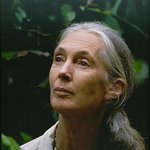By Elizabeth Willoughby on
“It’s as though we’re on a bus rushing towards a brick wall, but we’re arguing about which is the best seat,” says conservationist Jane Goodall quoting environmental activist David Suzuki.
Speaking about the moral and ethical responsibilities humans have with regards to the climate and environment, Goodall says, “Climate change absolutely is related to the choices we make and there’s no question but that we humans have had an enormous impact on the gradual heating up of the planet, which has escalated in the past decades. The melting of the ice at the poles is shocking. The glaciers disappearing is terrifying. The droughts getting worse and the flooding, it’s a very frightening sort of a world.”
But this world, in Goodall’s perspective, is a web of life, completely interrelated. The climate affects the environment, which affects the species within it, and the loss of a single species has ripple effects that aren’t always obvious. That is why when she works toward bringing an endangered species back to healthy numbers she also works on conserving its natural habitat. After all, she says, you don’t bring back a species to live in a zoo.
As a consequence of conserving a habitat, the other species that exist in that particular ecosystem receive the benefits as well. But to truly conserve a habitat, the humans within it must also benefit. Everyone must win, and then everyone wins.
“We can command what goes on in the natural world,” says Goodall. “We must take that responsibility seriously and ethically and do what is the right thing. I’m putting my energy onto raising awareness and begging people to take their responsibility to use their lives and whatever skills they have to make this a better world for animals. We’re animals too, so we are all in it together.”
Copyright © 2013 Look to the Stars





